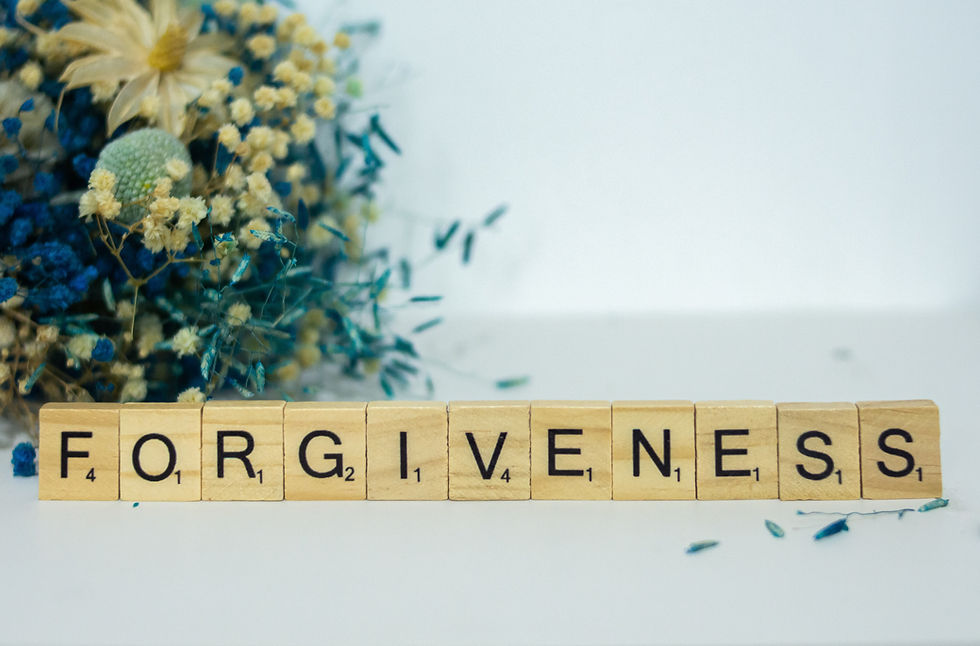Healing Without Forgiveness: Navigating the Path to Emotional Well-being
- Marlo Drago

- Apr 9, 2024
- 2 min read
In the realm of healing from past hurts and traumas, forgiveness often stands as a revered milestone. It's a concept deeply ingrained in many cultures and belief systems, touted as a crucial step towards personal liberation and inner peace. However, what if I told you that forgiveness isn't a mandatory checkpoint on the journey to healing? As a psychotherapist, I advocate for a perspective that honors the complexity of human emotions and acknowledges that healing is a deeply personal process that doesn't always necessitate forgiveness.

Let's unpack this notion further.
Understanding Forgiveness: Forgiveness is often misunderstood as condoning or excusing someone's harmful actions. However, forgiveness is more about releasing the grip of resentment and anger that those actions hold over us. It's about freeing ourselves from the burden of carrying that emotional baggage. Yet, forgiveness is not a linear process, and it's certainly not a one-size-fits-all solution.
The Pressure to Forgive: Society often pressures individuals to forgive, viewing it as a moral imperative or a sign of spiritual enlightenment. However, this pressure can be detrimental, especially for those who have experienced deep trauma or abuse. Forcing oneself to forgive prematurely can invalidate one's pain and prolong the healing process.
Validating Feelings: Healing begins with acknowledging and validating our own feelings, including anger, resentment, and pain. These emotions are valid responses to the harm inflicted upon us, and they deserve to be honored. Denying or suppressing these emotions in the pursuit of forgiveness can impede genuine healing.
Alternative Paths to Healing: It's essential to recognize that forgiveness is not the only path to healing. Some individuals may find healing through acceptance, letting go, or setting boundaries to protect themselves from further harm. Others may find solace in seeking justice or finding meaning in their experiences without forgiving the perpetrator.
Self-Compassion and Boundaries: Instead of fixating on forgiveness, I encourage my clients to focus on cultivating self-compassion and setting healthy boundaries. Self-compassion involves treating oneself with kindness and understanding, especially in the face of past trauma. Setting boundaries is about prioritizing one's well-being and protecting oneself from further harm.
Honoring Personal Truths: Healing is a deeply personal journey, and there is no one-size-fits-all approach. Each individual's path to healing is unique, shaped by their experiences, beliefs, and values. It's crucial to honor and respect each person's personal truths, even if it diverges from societal expectations or norms.
Embracing Complex Emotions: Healing without forgiveness does not mean holding onto bitterness or resentment indefinitely. It means embracing the complexity of human emotions and allowing oneself to feel and process those emotions fully. It's okay to feel angry, hurt, or disappointed, as long as we don't let those emotions consume us.
Healing is a multifaceted journey that doesn't always require forgiveness as a prerequisite. It's about validating our own feelings, cultivating self-compassion, and honoring our personal truths. As a psychotherapist, I advocate for a holistic approach to healing that embraces the complexity of human emotions and empowers individuals to find their own path to emotional well-being. Remember, you do not need to forgive someone to heal, but you do deserve to prioritize your own healing journey.
Please reach out if you would like to work on your healing journey.
In wellness,
Marlo Drago



Comments